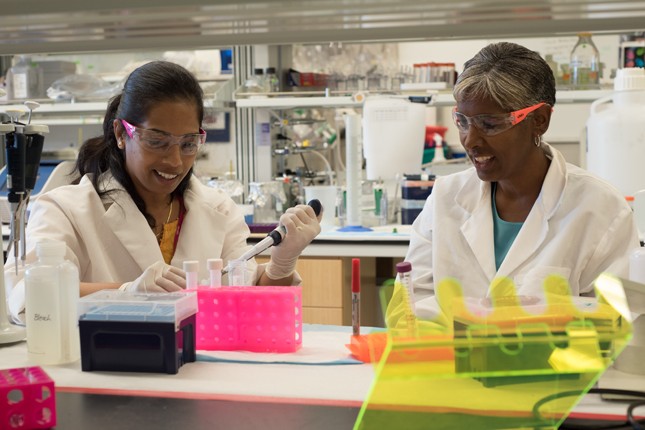Sarah England, PhD
Research focuses on maternal and child health

Sarah England, PhD, joined the Washington University School of Medicine faculty as professor of obstetrics and gynecology in July 2011. Born and raised in St. Paul, Minn., to a family of physicians, she notes she was naturally drawn to the creativity of scientific research and the art of discovery.
Prior to joining Washington University, she was a member of the faculty at the University of Iowa for more than 14 years. She earned her bachelor’s degree in biology from Carleton College and her doctorate in physiology from the Medical College of Wisconsin. Her post-doctoral fellowship was at Vanderbilt University in molecular physiology and biophysics.
Today England is considered one of the premiere authorities on the molecular mechanisms underlying uterine function during pregnancy. Specifically, her research focuses on understanding the role of potassium ion channels in the regulation of preterm labor, with the goal of developing better therapeutic pharmacologic targets.
While in Iowa, her interest in the broader ramifications of medicine and biomedical research intrigued England enough to pursue studies in health policy, leading ultimately to a 2005-06 Robert Wood Johnson Health Policy Fellowship. During this experience, she worked in the office of Senator Hillary Rodham Clinton on policies related to maternal-child health issues, women’s health and the health care workforce. “I truly appreciate having a broader understanding of how the research in the lab impacts women and children. Being able to understand how discoveries at the bench can translate to policy to address specific health care issues—both on the physical and emotional level—is rewarding,” she says.
England is an active research mentor and enjoys the excitement and creativeness that students and trainees bring with them to the lab and to the research process. “Students always have new questions and approach the work from such different mindsets. I enjoy how people at all training levels think approach a scientific problem –- that adds immense energy to the environment and to the discovery process,” she says.
As a highly successful African-American scientist engaged in academic biomedical research, England personally understands the importance of perseverance and persistence for underrepresented minority students pursuing careers in science or medicine. She also stresses the importance of both the individual and the institution in accepting accountability for creating success for underrepresented minority students. For academic institutions, she acknowledges the importance of the entire community’s commitment to creating an open and inclusive environment for all learners. “It’s not just a few faculty members of color representing what diversity means—it’s building a support system that is inclusive and involves everyone.”
For students, she says it is imperative to seek out help when it is needed and to remain open to receiving that help from a variety of sources. England says, “Many people from different backgrounds have contributed to my achievements. I believe that a student’s accomplishments depend in large part on a combination of hard work, persistence and taking ownership of his or her own success.”
Update
February 2015: England named the Alan A. and Edith L. Wolff Professor of Medicine
Read the Washington University Record story in the Newsroom »